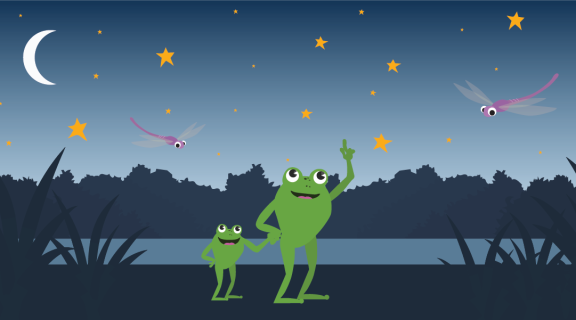
Star gazing
1 February 2022 | State Library of Queensland
The night sky is like a giant puzzle with a thousand stars and planets that fit together to make our universe. Children have a natural affinity to it, so make the most of these balmy, summer evenings to look to the sky with your little ones and build a galaxy of new words.
Choose a clear night when there is little moonlight or clouds and bring some star gazing tools such as binoculars, a telescope if you have one, bug spray, and a sketch pad so you can keep a record of your sightings. This is not only a great time to lie back and relax for a while, it’s also an opportunity to talk to your little one about the twinkling stars, constellations, shooting stars, planets and other things that light up in the sky that may not be stars – aeroplanes, satellites, the International Space Station.
It’s the ideal time to sing Twinkle, Twinkle Little Star together or make up a song about what you see in the night sky. Look up information about our solar system and planets, share this with your little one. You’ll be surprised how quickly the planet names will roll of their tongues.
Talk about how ‘vast’ the universe is. To make the concept something they can grasp, find something that is really, really small and put it in a really, really big scenario, such as holding a grain of sand in a soccer field.
Head to your local library in advance and borrow books about planets, stars, the moon or space travel:
- The Darkest Dark by Chris Hadfield
- There’s No Place Like Space by Tish Rabe
- A Hundred Billion Trillion Stars by Seth Fishman
- My First Book of Planets by Bruce Betts
- The Big Book of Stars and Planets by Emily Bone
- Look Inside Space by Jones Lloyd
- Give Me Some Space! By Philip Bunting
If these books aren’t available at your local library, ask about other titles or trying downloading an audio book from the collection.
Comments
Your email address will not be published.
We welcome relevant, respectful comments.